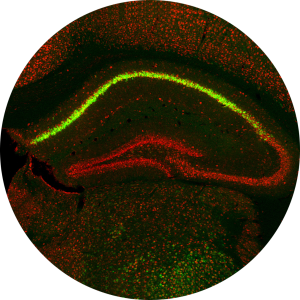
Manuela Rizzi. Identifying convergent dysregulation of mRNA translation in multiple models of autism
Motivation
Autism spectrum disorder (ASD) is increasingly diagnosed in the population, yet there remain no targeted treatments that can correct the underlying pathophysiology. This is due in part to a lack of information about the critical mechanisms that go awry in the neural circuits of the brain. However, it has been noted that mutations in many genes that encode regulators of mRNA translation, such as FMR1 gene encoding the translation repressor Fragile X Mental Retardation Protein (FMRP) and the SYNGAP1 gene encoding the Ras-ERK1/2 repressor SynGAP, are significant risk factors for ASD. Mutant models of these and other neurodevelopmental disorders exhibit excessive neuronal protein synthesis, suggesting the hypothesis that aberrant synaptic mRNA translation is a point of convergence for multiple genetic causes of ASD.
Research Challenge
If dysregulated mRNA translation is a common contributor to ASD then the important long-term goal is to address how disruptions in protein synthesis lead to cognitive and behavioural symptoms. An essential step is to identify the mistranslating mRNAs that lead to altered function in brain circuits that are affected in ASD models.
The group led by Dr. Emily Osterweil at the Centre for Discovery Brain Sciences (CDBS), University of Edinburgh is investigating the mechanisms of altered mRNA translation in key neuron populations of the Fmr1-/y and Syngap+/- models of ASD using advanced cell type-specific Translating Ribosome Affinity Purification (TRAP) and RNA sequencing. These studies are combined with electrophysiological stimulation and behavioural paradigms to assess the impact of alterations in activity-driven translation and test potential treatment strategies. By comparing the similarities in these models we hope to better understand the mistranslating mRNAs that commonly contribute to altered neural function, and ultimately identify novel therapeutic strategies for ASD.
Supervision and Secondments
The PhD project will be carried out in the Osterweil Lab at CDBS-UEDIN. The ESR will enrol in the Edinburgh Neuroscience PhD programme of the University of Edinburgh. The project also features secondments (extended stays) at CNC (Ana Luisa Carvalho) and IINS-CNRS (Daniel Choquet, Laurent Groc).
Supervisor: Emily Osterweil (Emily.Osterweil@ed.ac.uk)
Host Location: Centre for Discovery Brain Sciences (CDBS), University of Edinburgh, Edinburgh, Scotland.
< return to list of projects
